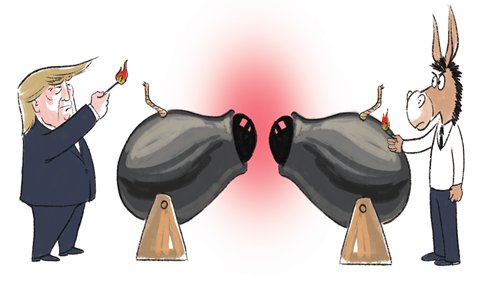
(Photo: Global Times)
On June 20, Trump signed an executive order to suspend the separation of children under a "zero tolerance" immigration policy that led to more than 2,300 kids being taken away from their parents as they illegally crossed the US-Mexico border.
As the media beamed scenes of wailing children snatched from their parents, the Trump administration was caught in an international firestorm of criticism. The United Nations called for an end to the policy, Americans protested, former president Barack Obama and several former first ladies blasted the move. Even First Lady Melania Trump weighed in saying that she "hates to see children separated from their families," and the US should be a country that "governs with heart."
Time magazine's most recent cover headline "Welcome to America" expressed irony over Trump's separation policy. Because of defending Trump's stance, White House press secretary Sarah Sanders was even asked to leave a restaurant in Virginia. Immigration reform has been caught up in a Congressional logjam. The House failed to pass a conservative bill proposed by Republicans, which would control the influx of immigrants and provide a pathway to citizenship for nearly 1 million "Dreamers" living in the US. Forty-one Republicans voted against it. House Speaker Paul Ryan had to delay a second vote on a compromise immigration bill. Trump, who originally supported the two bills, sent a tweet urging Republican lawmakers to drop them until after the midterm election.
Despite revoking family separation, Trump emphasized that zero tolerance for illegal immigrants will continue. Relevant authorities are still pondering on how to implement Trump's policy reversal, so it is difficult to say how long will it take for children to reunite with their parents. Trump's arbitrary implementation of the policy is mainly aimed at achieving a quick immigration reform to help Republicans win the midterm election. Immigration matters for employment and social security and has always been one of the major domestic issues Trump is most concerned about. It's also a card that he relied on for the 2016 election victory.
He has made voters many promises and must realize them as soon as possible in order to keep up his popularity. But as the immigration policy hits hurdles, Trump has blamed the Democratic Party as the main culprit, and instigated voters to believe that the high crime rate and social instability is a sabotage by the Democrats.
Some Republicans have different views. The majority agrees to immigration reform but disagrees with Trump's radical practices. For them, winning the election is also a top priority, but they believe the top agenda should be economy and tax reform, instead of immigration. As a result, the Republicans have been reluctant to promote immigration reform. Trump's inconsistent policies have pushed his party into anxiety and dilemma.
The Politico website believes that this is the "biggest moral and political crisis" of the Trump administration. The Democrats took full advantage of the situation to attack Trump and Republicans, portraying them as inhuman and even child abusers. Through a series of propaganda, the Democrats hope to draw Latin Americans in and encourage some Trump supporters to defect.
The immigration issue has become highly politicized, with all parties highlighting their own needs. But this incident is not necessarily Trump's political crisis, but a public relations crisis at the most. As the crisis ferments, the Trump administration's image at home and abroad has been further sullied, and future policies are also likely to be affected. However, whatever the media says, Trump's electoral base may not be undermined. He came to power holding the banner of populism and exclusivity, which is well known to his supporters. More importantly, immigration is one of the issues that voters are most concerned about.
A Pew Research Center survey in the 2016 election showed that 79 percent of Trump supporters believe that immigration was "very important," second only to economy and terrorism. A recent CNN survey also showed that 58 percent of Republicans support Trump's "zero tolerance" policy. This is an incentive for Trump to continue with immigration reform.
As a crisis-maker, Trump has repeatedly ignited domestic opposition, but none so far has seriously hurt him. He knows well that nothing is to be feared as long as he continues to cater to the supporting groups that secured him the 2016 election victory. The midterm election in November will be the watershed for Trump's remaining political life. It is foreseeable that before the vote, he will continue to issue controversial policies that his supporters favor, and the political struggle will continue.


